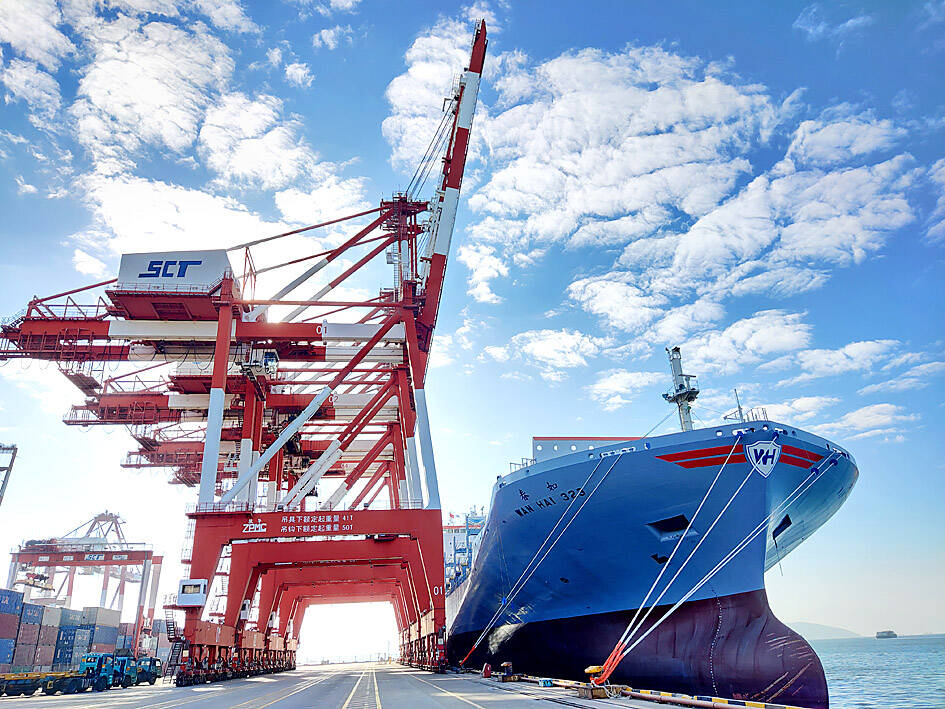Recent increases in shipping freight rates linked to the Red Sea crisis would provide a short-term boost in profit for Taiwanese container shipping firms, but the windfall is not expected to last nor end a shipping glut, Taiwan Ratings Corp (中華信評) said yesterday.
Freight rates have risen due to a bottleneck caused by rerouting to avoid attacks by Yemen-based Houthi rebels since the end of last year, the local arm of S&P Global Ratings said.
NEAR-TERM WINDFALL

Photo courtesy of Wan Hai Lines Ltd
“The increases provide a near-term windfall for Taiwanese container carriers,” said Susan Chen (陳宛暄), a corporate analyst at Taiwan Ratings whose clients include Wan Hai Lines Ltd (萬海) and Yang Ming Marine Transport Corp (陽明).
Like their global peers, Wan Hai and Yang Ming have rerouted their Europe, Mediterranean and US east coast ships around the Cape of Good Hope to avoid attacks, but the journey is a much longer one.
Although this would shore up container carriers’ bottom lines in the short term, it is unlikely to mute the impact of the industry’s overcapacity once operating conditions in the Red Sea return to normal, Chen said.
Both companies have become more flexible about their vessel scheduling and have made timely route changes to avoid service disruptions, which have driven up freight rates, she said.
However, the freight rate hikes are unlikely to match previous peaks, as the bottleneck is unlikely to persist and a supply glut is expected to last until the end of this year, the analyst said.
Total container shipping capacity would grow 7 to 9 percent this year, whereas demand would grow 2 to 4 percent, Taiwan Ratings said, adding that freight rates could drop in the second half of this year if there are no other major disruptions.
Demand for tangible goods has been weak amid a global economic slowdown, and there is a relative balance between supply and demand for goods and services compared with the COVID-19 years, Taiwan Ratings said.
That explained why shipping companies’ earnings took a dive last year after freight rates normalized, Chen said.
MARGIN PRESSURE
Wan Hai’s earnings before interest, taxes, depreciation and amortization (EBITDA) margin might recover to 15 to17 percent this year, from 11 to 13 percent last year, due to more balanced supply and demand conditions on intra-Asia routes, it said.
However, the company’s transpacific services could weigh on its margin due to its relative weak pricing power in this area, Taiwan Ratings said.
Yang Ming’s EBITDA margin would remain largely flat at 14 to 16 percent this year owing to more serious overcapacity on long-haul service lines, which underpin more than 70 percent of its total revenue, it said.
Despite pressures on profitability, both companies should maintain positive cash positions due to high cash balances from robust operations in 2021 and 2022, it said.

Quanta Computer Inc (廣達) chairman Barry Lam (林百里) is expected to share his views about the artificial intelligence (AI) industry’s prospects during his speech at the company’s 37th anniversary ceremony, as AI servers have become a new growth engine for the equipment manufacturing service provider. Lam’s speech is much anticipated, as Quanta has risen as one of the world’s major AI server suppliers. The company reported a 30 percent year-on-year growth in consolidated revenue to NT$1.41 trillion (US$43.35 billion) last year, thanks to fast-growing demand for servers, especially those with AI capabilities. The company told investors in November last year that

Intel Corp has named Tasha Chuang (莊蓓瑜) to lead Intel Taiwan in a bid to reinforce relations between the company and its Taiwanese partners. The appointment of Chuang as general manager for Intel Taiwan takes effect on Thursday, the firm said in a statement yesterday. Chuang is to lead her team in Taiwan to pursue product development and sales growth in an effort to reinforce the company’s ties with its partners and clients, Intel said. Chuang was previously in charge of managing Intel’s ties with leading Taiwanese PC brand Asustek Computer Inc (華碩), which included helping Asustek strengthen its global businesses, the company

Taiwanese suppliers to Taiwan Semiconductor Manufacturing Co. (TSMC, 台積電) are expected to follow the contract chipmaker’s step to invest in the US, but their relocation may be seven to eight years away, Minister of Economic Affairs J.W. Kuo (郭智輝) said yesterday. When asked by opposition Chinese Nationalist Party (KMT) Legislator Niu Hsu-ting (牛煦庭) in the legislature about growing concerns that TSMC’s huge investments in the US will prompt its suppliers to follow suit, Kuo said based on the chipmaker’s current limited production volume, it is unlikely to lead its supply chain to go there for now. “Unless TSMC completes its planned six

Power supply and electronic components maker Delta Electronics Inc (台達電) yesterday said it plans to ship its new 1 megawatt charging systems for electric trucks and buses in the first half of next year at the earliest. The new charging piles, which deliver up to 1 megawatt of charging power, are designed for heavy-duty electric vehicles, and support a maximum current of 1,500 amperes and output of 1,250 volts, Delta said in a news release. “If everything goes smoothly, we could begin shipping those new charging systems as early as in the first half of next year,” a company official said. The new